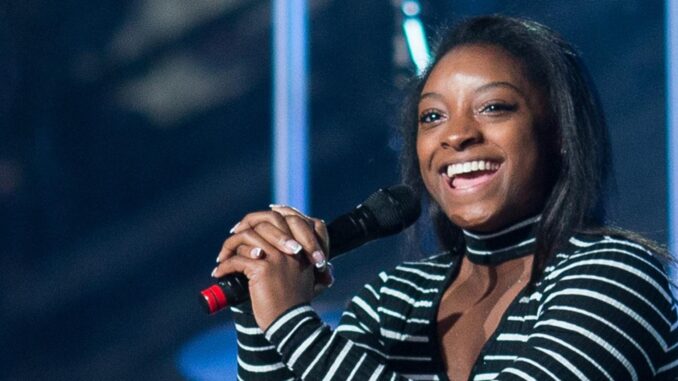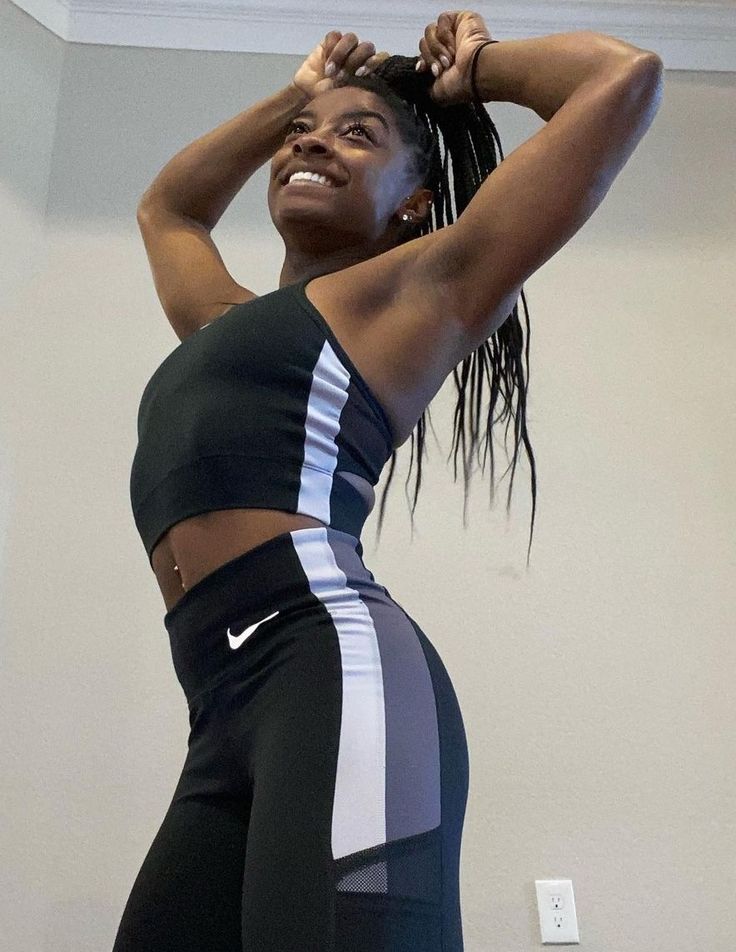
A rumor that circulated online in September 2025 claimed seven-time, Olympic gold-medal-winning gymnast Simone Biles commented on conservative activist Charlie Kirk’s past remarks about her after his fatal shooting that month. However, searches of Bing, DuckDuckGo and Google located no news media outlets confirming Biles made any recent statements about Kirk. A check of her Facebook, Instagram and X accounts showed she did not publish a post, a blog post or other comments about Kirk, either.
This rumor — a made-up claim — appeared in a popular post (archived) on a Facebook page with a “page transparency” tab revealing its owners as largely residing in Vietnam. That Facebook page’s post featured an external link to an advertisement-filled, artificial intelligence-generated blog article, where its authors earned ad revenue based on people reading their fabricated story.
Kirk, 31, was fatally shot on Sept. 10 at Utah Valley University in Orem, Utah, during his “The American Comeback Tour.” Prosecutors have since charged 22-year-old Tyler Robinson with multiple crimes, including aggravated murder, in the killing of the Turning Point USA co-founder. This article first lays out Kirk’s genuine past remarks about Biles — a topic for which Snopes readers searched in September — then provides additional details about the more recent rumor, including information about the claim’s Vietnamese and AI-generated origins.
What Kirk said about Biles in 2021
In July 2021, Kirk made remarks about Biles on his internet-hosted “The Charlie Kirk Show.” During his show, he provided his thoughts about the breaking news of Biles withdrawing from participating in further competition during the COVID-delayed 2020 Tokyo Olympics. At the time, The Associated Press (AP) and ESPN reported about Biles’ withdrawing for mental health reasons. The AP and ESPN subsequently published articles about her experiencing the “twisties” — the term for a gymnast’s sudden mental inability to compete with the requisite spins for a particular maneuver.
On Kirk’s July 27, 2021, show, he began his segment about Biles by saying he didn’t know whether anyone had ever sexually assaulted her, more than three years after Biles said ex-U.S. Olympic gymnastics team doctor Larry Nassar had molested her. Judges sentenced Nassar to jail for what essentially amounted to a life sentence following allegations of sexually assaulting nearly 160 victims. Kirk said:
So, Simone Biles. I don’t know her politics. I don’t. I just know that she’s being shown on television a lot. I don’t know if she was ever sexually assaulted or abused. So, I don’t, I don’t know what she’s been through. I seriously, I mean that sincerely. However, I’m going to say this. Don’t show up to the Olympics and compete if you’re not ready for the big moments.
Kirk then railed against Biles for withdrawing from further competition, calling her “you selfish sociopath,” “weak,” “very selfish,” “immature,” “a shame to the country,” “totally a sociopath, of course she’s a sociopath” and “a disgrace.” Kirk’s comments about Biles begin at the 54:03 mark in the full episode, available on Rumble.com. On the next day, Kirk reposted (archived) a video displaying his remarks on X and added, “Just so we’re clear—I stand by every word of this.”
When it comes to the world of sports and politics, controversy is never far away. During the 2021 Tokyo Olympics, gymnast Simone Biles made headlines for prioritizing her mental health and stepping back from several events. While many applauded her courage, others were quick to criticize—including conservative commentator Charlie Kirk. Years later, following Kirk’s death, questions resurfaced: Why did Simone Biles never respond to his remarks?
This article dives into the background of the controversy, explores the lasting impact of both Biles’ decision and Kirk’s critique, and explains why silence can sometimes be the loudest response.
The 2021 Olympics: A Turning Point in Sports
The Tokyo Olympics were unlike any before. With the shadow of the pandemic and strict rules for athletes, the games already carried immense pressure. Simone Biles, the world’s most decorated gymnast, entered the competition with sky-high expectations. But when she withdrew from key events, the world paused.
Why Simone Biles Stepped Back
Biles explained her decision with honesty and vulnerability. She struggled with the “twisties,” a mental block in gymnastics that makes complex maneuvers dangerous. Prioritizing her safety, she withdrew. Instead of risking serious injury, she chose her well-being—a decision that challenged old notions of toughness in sports.
Charlie Kirk’s Harsh Criticism
Not everyone understood or accepted her choice. Conservative commentator Charlie Kirk blasted Biles publicly, calling her actions selfish and unpatriotic. His comments spread quickly, sparking fierce debates across social media and news platforms. To some, his words felt unnecessarily cruel. To others, they resonated with the idea that athletes should “push through” no matter what.
Public Backlash Against Kirk
Kirk’s statements faced immediate backlash. Fans, athletes, and mental health advocates defended Biles, emphasizing that courage isn’t just about competing—it’s also about knowing when to stop. The controversy highlighted the generational and cultural divide around mental health.
Biles’ Silence: A Powerful Response
Through it all, Simone Biles never directly addressed Kirk’s comments. Her silence spoke louder than any rebuttal. By refusing to engage, she shifted the focus back to her journey, her health, and her achievements. Sometimes, silence is the strongest form of strength—it leaves critics without the attention they often seek.
Charlie Kirk’s Death: A Complicated Legacy
When Charlie Kirk passed away, his death reignited discussions about his controversial takes. Among them, his remarks about Biles resurfaced. Yet, even then, Biles stayed quiet. Her refusal to respond underscored a key point: not every criticism deserves an answer.
Why Biles Never Responded
So, why didn’t Biles respond? Several reasons stand out:
-
Protecting her mental health – Engaging with negativity could have added unnecessary stress.
-
Focusing on her career – Biles returned to win more medals and continued to inspire athletes worldwide.
-
Letting her actions speak – Her legacy wasn’t about arguing; it was about proving her resilience.
The Bigger Picture: Mental Health in Sports
Biles’ decision changed the way the sports world views mental health. She showed that strength isn’t about suppressing struggles—it’s about acknowledging them. Her story became a rallying cry for athletes at every level.
Silence vs. Engagement in Public Life
Biles’ silence contrasted sharply with the noise of public discourse. In a culture where everyone feels pressured to “clap back,” she chose a different path. Sometimes the best way to win an argument is not to have it at all.
Public Opinion: Divided Yet Evolving
The public remained divided. Some admired Biles’ courage, while others echoed Kirk’s sentiments. But as time passes, more people recognize that prioritizing mental health doesn’t make someone weak—it makes them human.
Charlie Kirk’s Legacy in Media
Kirk built a career on bold, often polarizing statements. His critique of Biles was one example of his confrontational style. While it earned him attention, it also cemented his role as a controversial figure in American media.
Simone Biles’ Lasting Influence
Meanwhile, Biles’ influence only grew. She returned to gymnastics, added more medals to her name, and became a global advocate for athlete mental health. Her silence regarding Kirk wasn’t a dismissal—it was a choice to focus on impact rather than controversy.

The Lesson in Silence
Biles taught a powerful lesson: silence doesn’t mean weakness. In fact, it can highlight resilience, maturity, and self-respect. By staying quiet, she refused to validate Kirk’s words with her energy.
The Media’s Role in Fueling Conflict
It’s worth noting how the media amplified the story. Outlets replayed Kirk’s criticism endlessly, sometimes overshadowing Biles’ own narrative. The cycle showed how media thrives on conflict—yet Biles resisted being dragged into it.
Looking Ahead: Athletes and Public Scrutiny
The Biles-Kirk controversy is part of a larger conversation. Athletes today face intense public scrutiny, and their personal decisions are often politicized. Moving forward, the challenge is balancing accountability with empathy.
Conclusion
Simone Biles never responded to Charlie Kirk’s 2021 Olympic comments, even after his death. And in that silence, she delivered her most powerful message. By focusing on her journey and refusing to fuel negativity, she showed that strength sometimes means walking away from conflict. Her choice reminds us all: not every battle is worth fighting, and sometimes silence speaks volumes.